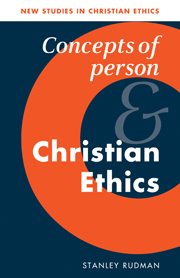Book contents
PART 3 - IMPLICATIONS FOR A CHRISTIAN ETHIC
Published online by Cambridge University Press: 02 December 2009
Summary
No single moral theory has been able to capture all that is required of a universally acceptable moral theory. Even the staunch defenders of utilitarianism and Kantianism usually recognise as much. Utilitarianism has prided itself on reducing morality to a single principle, but finds it impossible to give a clear answer to the question of what a life is worth. In fact, in more recent modified versions, such as rational preference utilitarianism, there is an attempt to feed off an underlying sense of moral obligatoriness. Utilitarianism is best understood as an attempt to relate morality more closely to empirical circumstance. Kant's emphasis on respect for persons in their own right, on universalisation, and on duty for the sake of duty, clearly represents important aspects of morality, but at the cost of leaving much of the content of morality non-specific. Dissatisfaction with aspects of utilitarianism has led some to search for a rights-based ethic that would incorporate features of utilitarianism.
Christian ethics has never attempted to provide an overall ethical theory. The theories of Plato and Aristotle were already in the field when Christianity arrived with its new way of life and will of God ethic. Now, as then, it brings to moral theory an overall vision of life, a way of relating to God and others, a concern for specific values such as loving kindness, justice and mercy for the weak and defenceless.
- Type
- Chapter
- Information
- Concepts of Person and Christian Ethics , pp. 223 - 226Publisher: Cambridge University PressPrint publication year: 1997



